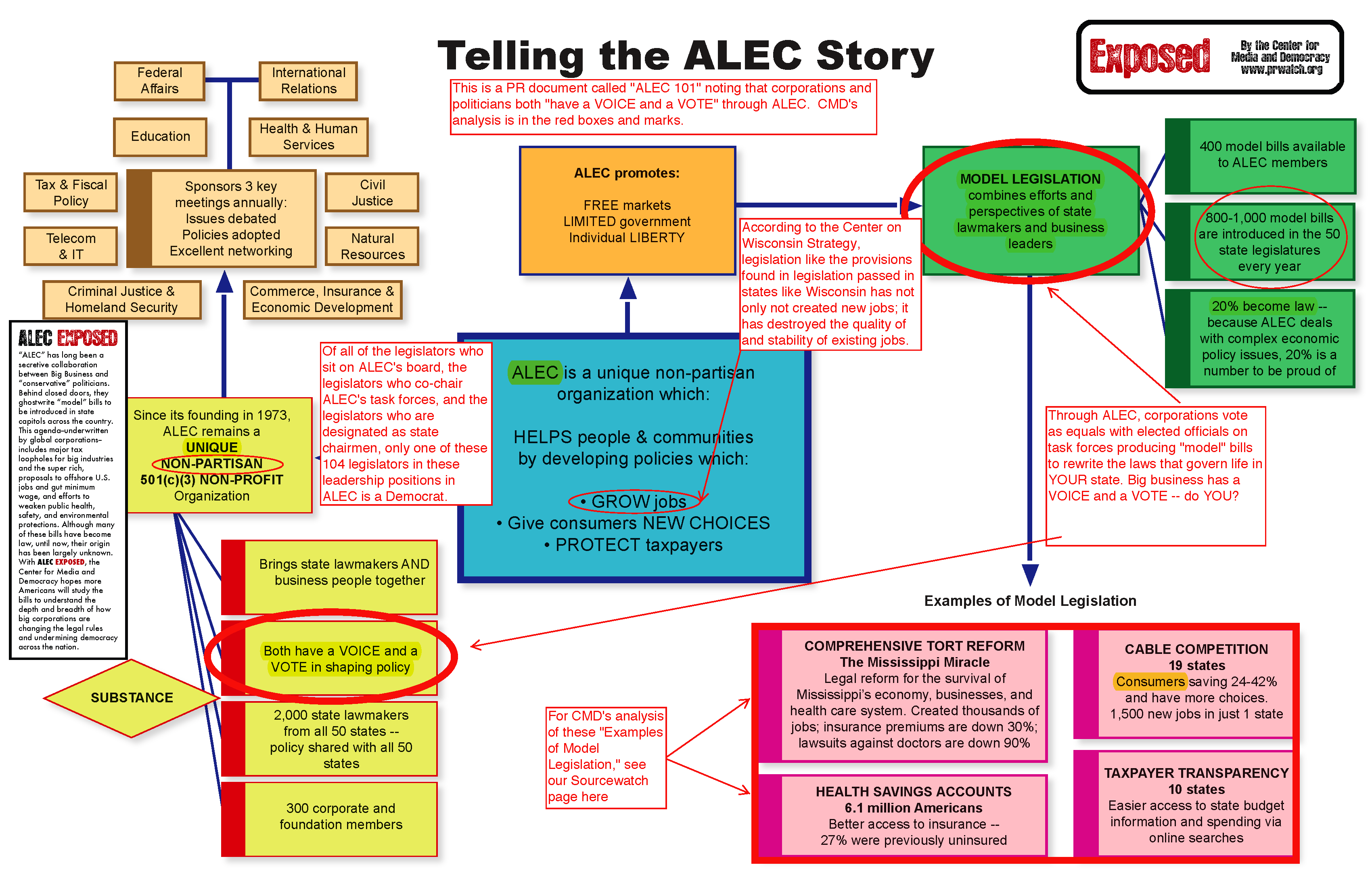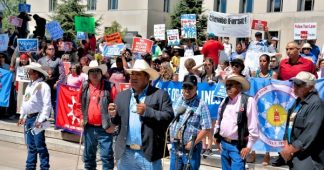Wyoming Now Third State to Propose ALEC Bill Cracking Down on Pipeline Protests
By Steve Horn
February 21, 2018
On the heels of Iowa and Ohio, Wyoming has become the third state to introduce a bill criminalizing the type of activities undertaken by past oil and gas pipeline protesters.
One of the Wyoming bill’s co-sponsors even says it was inspired by the protests led by the Standing Rock Sioux Tribe against the Dakota Access pipeline, and a sheriff involved in policing those protests testified in support of the bill at a recent hearing. Wyoming’s bill is essentially a copy-paste version of template legislation produced by the conservative, corporate-funded American Legislative Exchange Council (ALEC).
At the organization’s December meeting, ALEC members voted on the model bill, the Critical Infrastructure Protection Act, which afterward was introduced in both Iowa and Ohio.
Like the ALEC version, Wyoming’s Senate File 74 makes “impeding critical infrastructure … a felony punishable by imprisonment for not more than ten (10) years, a fine of not more than one hundred thousand dollars ($100,000.00), or both.” Two of the bill sponsors of SF 74, Republican Sens. Eli Bebout and Nathan Winters, are ALEC members. SF 74 has passed unanimously out of its Senate Judiciary Committee and now moves onto the full floor.
ALEC‘s model bill, in turn, was based on two Oklahoma bills, HB 1123 and HB 2128. The Sooner State bills, now official state law, likewise impose felony sentencing, 10 years in prison, and/or a $100,000 fine on individuals who “willfully damage, destroy, vandalize, deface, or tamper with equipment in a critical infrastructure facility.” As DeSmog has reported, the Iowa bill has the lobbying support of Energy Transfer Partners — the owner of the Dakota Access pipeline (DAPL) which runs through the state — as well as that of the American Petroleum Institute and other oil and gas industry companies.
ALEC brings together primarily Republican Party state legislators and lobbyists to enact and vote on “model” legislation at its meetings, which take place several times a year. Within different task forces at these meetings, corporate lobbyists can voice their support or critiques of bills, while also getting a vote. Those bills often then are introduced as legislation in statehouses nationwide, as in this latest example in Wyoming.
Hydraulic fracturing (“fracking”) in Wyoming has helped the state vastly increase its natural gas production and spurred pipeline build-out. However, multiple studies in recent years have also linked fracking-related activities around the small town of Pavilion to groundwater contamination.
 Credit: Center for Media and Democracy
Credit: Center for Media and Democracy
Targeting ‘Ecoterrorism’
Wyoming’s bill, like the ALEC model bill and one of the Oklahoma bills, includes language implicating any organization “found to be a conspirator” and lobbing a $1 million fine on any group which “aids, abets, solicits, encourages, hires, conspires, commands, or procures a person to commit the crime of impeding critical infrastructure.”
State Senate Judiciary Committee Chairman Leland Christensen, a Republican and one of the bill’s co-sponsors, said when he introduced the bill that legislative language was needed to hold accountable those “organizations that sponsor this kind of ecoterrorism.”
The fiscal note for the Wyoming bill says that the “fiscal impact to the judicial system is indeterminable,” while also discussing the prospective costs of incarcerating people under the auspices of the legislation.
“The Department of Corrections states that the impact of the bill is indeterminable as there is currently no way to accurately estimate the number of offenders that will be sentenced pursuant to the bill,” reads the fiscal note. “Each year of incarceration currently costs the state approximately $41,537 per inmate, including medical costs. Each year of community supervision costs the state approximately $2,000 per inmate.”
ALEC Model Confirmed
One co-sponsor of the Wyoming bill, its sole Democratic supporter, Rep. Stan Black, told WyoFile.com that the bill was inspired by what took place at the Standing Rock Sioux Reservation and that SF 74 was based on the ALEC model bill.
Shortly after ALEC members voted to adopt the Oklahoma legislation as a model bill, Oklahoma’s HB 1123 was also adopted by the corporate-funded Council of State Governments (CSG) as a piece of “Shared State Legislation” (SSL) at its own annual meeting held just a week later.
One of the state legislative officials sitting on CSG‘s Committee on Shared State Legislation, North Dakota’s Republican Rep. Kim Koppelman, has a long history of involvement with ALEC, and throughout 2017 he spoke critically of the Indigenous-led movement against the Dakota Access pipeline.
“One of the major issues we dealt with was several bills introduced in response to the violent protests at the site of the Dakota Access pipeline,” Koppelman wrote in a February 2017 article halfway through the North Dakota Legislature’s session. “As you may know, peaceful protests led by Native American tribes began this summer but they attracted others from throughout the nation and deteriorated into illegal occupation of sites on federal land, trespassing on private land, blocking of roadways and some incidents of violence.”
At the beginning of 2017, Koppelman co-sponsored three pieces of North Dakota legislation, which crack down on pipeline protests. Two of them passed and are now state law.
The bills “struck a good balance to ensure everyone’s constitutional right to peacefully protest, which we cherish, but to provide for appropriate consequences when anyone crosses the line into anarchy, terrorizing or destruction of property,” wrote Koppelman in his article. “These bills have been fast tracked to give law enforcement the tools they need.”
After DeSmog filed an open records request pertaining to Koppelman’s ALEC and CSG efforts in this area, he told DeSmog, “I have no documents or records concerning the subject of your request but, even if I did, you should be aware that, under North Dakota Century Code Section 44-04-18.6, communications and records of a member of the North Dakota Legislative Assembly are not subject to disclosure.”
In a follow-up email exchange, Koppelman told DeSmog that he “had no role in bringing the bill” to CSG and does not know who did so.
“Frankly, I don’t even specifically recall the bill you’ve inquired about, without going back to review it,” Koppelman told DeSmog. “I also don’t recall who may have supported or opposed it at that meeting, either on the Committee or among the members of the public in the audience.”
For the ALEC bill, Koppelman also said he could not speak to its origins as a model or who has pushed it at the state-level since becoming a model. When asked by DeSmog if CSG records the Shared State Legislation meetings or keeps minutes, Koppelman said that he does not believe so “because the result of meetings and the committee’s work is in the published volume” of Shared State Legislation which CSG disseminates annually.
CSG has in the past, though, kept meeting minutes of its SSL voting sessions, doing so as recently as 2014. Those minutes included an attendance list, which listed nearly three times the number of lobbyists present as state legislators and showed industry attendees representing both the American Gas Association and the Consumer Energy Alliance.
According to a letter obtained and published by HuffPost, the ALEC model bill has also enjoyed the backing of the American Gas Association, American Chemistry Council, American Fuel & Petrochemical Manufacturers (AFPM), and Marathon Petroleum.
Industry, Cops Push ALEC Bill in Wyoming
According to a follow-up story by WyoFile.com, the Wyoming Senate Judiciary Committee had Wyoming Business Alliance lobbyist Cindy DeLancey, rather than the lead sponsor, Sen. Christensen, introduce the bill in front of the committee.
Before taking over as head of the Wyoming Business Alliance, DeLancey worked as a director of government and public affairs for BP, where she did “government and public affairs support for the Leadership Team of the Lower 48 North Business Unit,” according to her LinkedIn profile. DeLancey’s Wyoming Business Alliance biography also shows that she formerly served as the chair of the Petroleum Association of Wyoming’s Government and Public Relations Committee. She did not respond to a request for comment.
Wyoming Business Alliance steering committee members include representatives from the Petroleum Association of Wyoming, Chesapeake Energy, Devon Energy, and Jonah Energy. Petroleum Association of Wyoming leadership committees consist of representatives from companies such as Devon Energy, Chesapeake Energy, BP, Anadarko Petroleum, and other companies, while its board of directors lists officials from those companies, plus ExxonMobil, EOG Resources, Halliburton, Williams Companies, and others.
WyoFile.com has reported that, according to a document received from Sen. Christensen, the Petroleum Association and other oil and gas companies have also come out as official supporters of the bill, along with law enforcement representatives. The Wyoming bill’s official backers include the Wyoming Association of Sheriffs and Chiefs of Police, the Wyoming Business Alliance, the Petroleum Association of Wyoming, the Wyoming Petroleum Marketers Association, American Fuel and Petrochemical Manufacturers (AFPM), Holly Frontier Corporation, Anadarko Petroleum, and ONEOK.
According to a special events calendar obtained by DeSmog, the Wyoming Business Alliance hosted a reception at the Cheyenne Botanic Gardens on February 12, just days after Wyoming bill SF 74 was introduced on February 9.
On March 1, ALEC will also host a reception at the Nagle-Warren Mansion Cheyenne, according to that calendar, with invited guests asked to RSVP to Wendy Lowe or David Picard. Picard currently has no oil and gas industry lobbying clients, according to his lobbying disclosures, but his lobbying firm’s website says he formerly did so for companies such as Shell, BP, and Marathon. He did not respond to a request for comment for this story.
According to lobbying disclosure forms, Lowe works as a lobbyist for Williams Companies, a major pipeline company with over 3,700 miles of pipeline laid in Wyoming. Lowe also formerly served as associate director of the Petroleum Association of Wyoming, according to her LinkedIn Profile.
 Credit: Wyoming State Legislature
Credit: Wyoming State Legislature
Lowe, the private sector chairwoman for ALEC in Wyoming as of 2014, won the state chair of the year award from ALEC in 2012. She has also previously received corporate-funded “scholarship” gifts to attend ALEC meetings as an official Wyoming representative, according to a 2013 report published by the nonprofit watchdog group Center for Media and Democracy.
An ALEC newsletter from May 2011 shows that, at an ALEC event Lowe co-hosted in 2011 in Wyoming, she praised the organization for “creating a unique environment in which state legislators and private sector leaders can come together, share ideas, and cooperate in developing effective policy solutions.”
The Center for Media and Democracy also reported in 2014 that Lowe, a former Peabody Energy lobbyist, gave a presentation titled, “Increasing Travel Reimbursement Income” at an ALEC meeting in Chicago in 2013. But Lowe told DeSmog that, although she attended the Senate hearing on the bill, she did not know about it until it was proposed and is not lobbying for it.
National Sheriffs: DAPL Full Circle
At a state Senate Judiciary Committee hearing on the Wyoming bill, Laramie County Sheriff Danny Glick also came out in support of the legislation, warning that a situation similar to Standing Rock could happen in Wyoming.
“One of our Niobrara county commissioners already has graffiti going up — ‘No DAPL’ — in that area up there,” Glick said at the hearing, referring to the shorthand for the Dakota Access pipeline. Glick, an Executive Committee member and Immediate Past President of the National Sheriffs’ Association, was one of the most supportive sheriffs pushing what has been characterized as a heavy-handed and militaristic reaction by law enforcement to the activism at Standing Rock.
Under the direction of Glick, Laramie County sent officers to the Dakota Access protests under the auspices of the Emergency Management Assistance Compact (EMAC), triggered after North Dakota’s Republican Governor Jack Dalrymple issued an emergency order on August 19, 2016. Glick too, spent time at Standing Rock and spoke at a press conference alongside Morton County Sheriff Kyle Kirchmeier on October 6, 2016.
Glick, who attended a roundtable meeting at the White House in February 2017 with President Donald Trump and other sheriffs, was also previously CC‘d on a set of emails obtained by DeSmog and Muckrock in which the National Sheriffs’ Association and public relations firms it had hired wrote talking points in an attempt to discredit those who participated at Standing Rock. Those talking points said to describe the anti-pipeline movement as rife with “anarchists” and “Palestinian activists” who used violence and possessed “guns, knives, etc.”
‘Worst Instincts of Power’
Critics say the Wyoming bill could have far-reaching and negative impacts, if it becomes law, both in terms of criminal sentencing and for First Amendment rights. The American Civil Liberties Union of Wyoming, for example, has come out against the bill on both grounds.
Wyoming politicians have introduced anti-protest and anti-free speech legislation, Senate File 74. This bill is designed to shut down protests and activism. Contact your elected representatives today and ask them to stand up for the First Amendment! #WyLeg
— ACLU of Wyoming (@ACLUWYO) February 20, 2018
The Sierra Club in Wyoming agreed, saying in an email blast that the bill is “explicitly designed to crush public opposition to projects like the Dakota Access and Keystone pipelines, by preventing the kind of protests that occurred at Standing Rock.”
Even people representing industry interests and within the Republican Party have come out against the bill as it currently reads.
“This bill appeals to the absolute worst instincts of power,” Larry Wolfe, a Wyoming attorney who represents the oil and gas industry, said at a hearing about the bill, according to WyoFile.com. “We the powerful must protect things that are already protected under existing law.”
Republican Senator Cale Case largely echoed the concerns put forward by Wolfe.
“This country has been through WWII, civil unrest in the 1960s and a heck of a lot more, but we didn’t need legislation like this,” Case conveyed in an email to WyoFile.com. “Good laws already exist to protect property without this chilling impact on free speech.”
Main image: On August 31, 2016, “Happy” American Horse from the Sicangu Nation locked himself to construction equipment as a direct action against the Dakota Access pipeline. Credit: Desiree Kane, CC BY 3.0
Published at https://www.desmogblog.com/2018/02/21/wyoming-alec-model-bill-pipeline-protests











